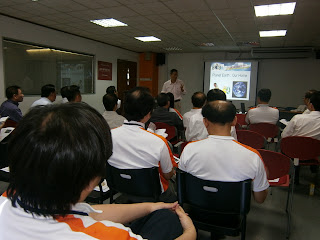Mr Low conducted the assembly talk from 7.40 till 8.15 am. He presented on the effects of Climate change on the world (including Arctic Ice melt, Droughts, Floods Sea level rise etc). He showcased various solutions that scientists recommended to curb climate change. (i.e. Plant trees, Eat less meat, Green energy, 3Rs). At the end of the presentation, Mr Low conducted a 5-min Quiz, students participated actively in the Quiz.
After the talk, team members set up a booth at the school canteen. We distribute "Eco-websites on climate change" leaflets & MRT card holders to the students. We also distribute free copies of Climate change Booklet to the teachers. We manned the booth from 9 till 12.30pm.
The following are some feedbacks for the assembly talk:
Teacher’s
Feedback:
“Excellent variation of presentation with video and powerpoint.
Informative, clear and impactful message.”
- Margart Yeo, Innova Primary teacher
“Very informative. I like the part about food and the environment,
something that I didn’t know. Would recommend to others and adopt the
lifestyle.”
– Ms Fio Ang Hwee tit, Environment Co-ordinator, Innova Primary
teacher
“Very informative and interesting.” - Mr Chong TK, Innova Primary teacher
Students’
Feedback:
I like the
presentation. It is very interesting. I have learn a lot about Global Warming
. – Syarwina Ridwan, Student
I am going to
try my best to save the Earth because billions of people are homeless and had
no food to eat.
– Nur Zafirah, student
The talk is full
of excitement, I can relate to the videos (before and after). I can help by
saving water and eating less meat
- Regina, student
I like the talk.
I learnt how to save Mother Earth. I will shorten my shower from 15 mins to 5
mins.
– Jing Yi, student
– Jing Yi, student
I like the talk
because it is interesting and I learn a lot. For example: Do not cut down
trees, eat more veggies and less meat. I will cycle or walk to school.
– Clement Ho, student






















